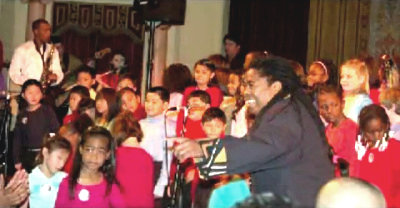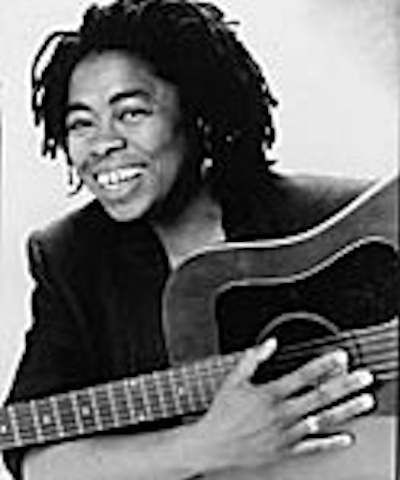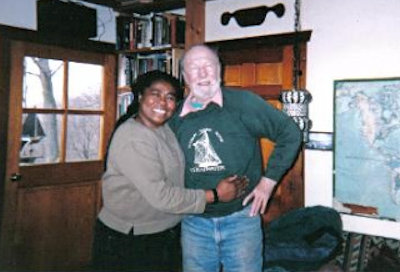
Melanie DeMore
Music as Community Connector and Food for the Soul
by Lily Emerson
This past summer, I was lucky enough to interview Melanie DeMore, the phenomenal keynote speaker for the recent Children’s Music Network Conference in Los Gatos, California. Afterwards, I was left feeling incredibly inspired. Selections of our conversation were originally published in the CMN blog: Part One and Part Two.
If you are unfamiliar with this extraordinary person, Melanie DeMore is a multitalented singer, composer, performer, choral instructor, and “vocal activist,” and has been involved with a number of organizations and ongoing community actions over the last several years. The following comprises a few connected moments from the original blog posts as well as parts of our conversation that were omitted.
Music and Connection
Melanie DeMore: I think the main thing that we need to remember is that music, again, not only is it food, it’s the thing that ties everybody together and makes them equal. It is the one time when people are singing together and making music together; in that moment, they are together.
Because you have to do the rhythms together, your feet are doing something different than your hands, you’re singing, you’re doing all these other things, and when you get that many people together who are moving and doing all that stuff together, it is extremely powerful and it makes the group more cohesive. So it’s really about community building, which is the entire premise of everything that I do musically; whether it’s little kids or professional choirs, that is the entire purpose: the tightening of whatever community that is. Tightening the weave. It’s just so important, especially these days. What are the things that tie us, that connect us to each other?
Your job is to go and teach the song that you learned today to somebody else.
With my little kids, I would ask them, “What do you need to feel safe? Do you know that a little kid in Syria or Iraq or Ghana needs exactly the same thing?” So that when we sing these songs, like a song I wrote called “For All the Children in the World,” you’re getting to sing for people who maybe don’t get to sing. Your song is wrapping somebody else up, so I want them to think about that; what happens to somebody over there affects you. They’re little kids, and they’re like, “We get that. We understand that.” It all comes back to tightening the weave of community and connection. If it doesn’t do that, I ain’t interested.
For nine years I conducted a children’s choir. I wrote mostly all-new music, and it was important to me that the music first of all reflected what was going on in the community and in the country. I also instructed them, after every rehearsal, “Your job is to go and teach the song that you learned today to somebody else.” That’s really important to me.
Generally, I would write really interesting music for them that was fun to sing, but that had something that they could carry out throughout their lives. You know, that they could call up. Planting seeds in there. Giving them tools for how to walk around in the world.
 Oakland Children’s Choir
Oakland Children’s Choir
I had a young woman who obviously had been through a lot of really hard things, and I had written a song earlier called “I Can Do That,” because to be able to do anything, somebody just has to show you. I wanted to help them come from that point of view. “Yes, I can do that. Show me,” instead of, “No, I can’t do that,” which automatically puts you down. So I used this piece a lot, and she sent me a message on Facebook a little bit after that, and she said, “You know, I decided I was going to audition for this musical, and I got really scared, and then I remembered the song, ‘I can do that, I just don’t know how yet,’ so I’m going to do it.”
You see, if you’re going to pass that knowledge along, pass on something you can use. What’s the point, otherwise? Because music is so powerful, and imprints on you, if you can imprint something that people can use, that’s really important. That’s the most important thing. I don’t want to give them empty calories.
Lily Emerson: Is that where your Sound Awareness program came from?
Sound Awareness is just a blanket. It’s an umbrella term for a bunch of different classes under what I call Sound Awareness. So, for instance, under my umbrella of Sound Awareness, I developed a whole curriculum based on American Idol.
Because one year when I was at St Paul’s [Episcopal School] in Oakland, one of the top four was a kid I’d trained for the Oakland Youth Chorus. The top four, here in Oakland! So the kids were really into it, and I thought, “Well, okay, let me just think about this,” since I knew they were watching it.
The kids kept a journal, and I talked with the other teachers, because it wasn’t just about the music. They had to look at demographics. They had to keep track of what was the top news story each week. We talked about different statistical things, about how over the years in American Idol—most people don’t even realize this—most of the winners are from the South, so we talked about those kind of things. We had a whole list of vocabulary words that go along with pop culture, and one of their vocabulary words was “arbitrary,” because nothing is arbitrary. Everything you see on TV is absolutely coordinated.
One year, doing this with the kids, I said, “Hey, let’s look at our commercials, and see...” because they had to keep good track of the commercials. And they’d say, “Oh, they don’t mean anything,” and I’d say, “I want you to keep track of them.” And so we’re looking at the commercials, and I said, “What’s different than when we looked at these a couple weeks ago?” And you know how sixth graders are, they’ll give you 60 million different answers before they land on the one, and finally one of them said, “Oh yeah, Ms. DeMore. There were more commercials for the military.” “Huh, isn’t that interesting?” And they said “Yeah. They’re just commercials.” And I said “What is the top news story this week in the country?” And all of the sudden someone said, “Oh yeah! They need more soldiers!” And I said, “Hmm…isn’t that interesting? Why do you think there would be more commercials for the military on American Idol?” They said, “Oh, they’re just commercials.” And I said, “Let’s go back. What is the average age of people who watch American Idol?” And the kids were like, “Huh?” “Isn’t that interesting?” This was the week after the war in Iraq began.
That’s why I wanted them to look and keep a journal, because it has everything to do with music, but also feels like the pulse of what was going on in our country. Also, it’s all kinds of things having to do with democracy, because you vote on American Idol. I said to them, “So, is this, in our terms of democracy and our rules (one person, one vote), is American Idol really based on the premise of democracy?” They said, “Sure, you get to vote!” and I said, “But don’t you get to vote as many times as you want to? You can vote ten times on the computer, ten times by phone, ten times by text.” I said, “Is that really democracy?”

And then I would throw them another question, and say, “If they give you a list of 500 songs and say ‘You can pick any song you want to,’ is that freedom of choice?” and they’d go, “Yeah, you get to pick any song you want to.” I’d say, “Let me ask you again. If they give you a list of 500 songs and say you can pick anything you want, is that freedom of choice?” And after a while, the kids are like, “Well, I guess if they write the list, then maybe they’ve already picked the things for you. You’re just picking whatever is approved by them to pick.” I said, “BINGO.”
It sounds like a combination of critical thinking and awareness about how music is used in media.
Exactly. It’s completely about critical thinking. There’s a whole other course under Sound Awareness where students have to bring in the lyrics of their favorite song. They have to write it in their own handwriting. And that’s to talk to them about how music is imprinted on them, before they understand what it really means. If they have to sit down and write it, it makes them think more about what it is that they’re writing, so that they begin to look at what it is. I’ll say, “You have to give me three reasons why you like it, and ‘it’s got a great beat’ and ‘just because’ are not reasons! Here’s the piece of music that you really love. Does that represent who you are when you walk into the room? And how are you affected by the music that you listen to?”
And a lot of them say, “I’m not affected by any of that, I’m not affected by any commercials or music videos,” And I say, “Oh, I’m looking at you and you are nothing but wearing designer labels all the time.” I said, “You’ve got to think about this.”
So this is the kind of stuff we talk about. About being awake, and being aware of how the music and the words affect you. If you’re not awake, you don’t understand how you are being manipulated—as to what to buy, what to wear, how to speak, how to interact with your friends, you know. So to me, that’s all under sound awareness.
That seems like a pretty essential thing to be teaching kids, particularly at the sixth grade level, since it’s a time when you’re trying to define yourself by what you’re wearing and how you can fit in, and becoming aware as to how manipulated you are by the media.
Right?
I was working with a choir, and these people were rigid. I said, ‘You’ve got to put more of yourself into the piece.’ They said, ‘But we’re doing Bach’s B-Minor Mass.’ And I said, ‘Can I remind you that Bach had twenty children?’
On the connection between audience and performer, and putting yourself into what you’re singing:
I was working with a choir, and these people were rigid. I said, “You’ve got to put more of yourself into the piece.” They said, “But we’re doing Bach’s B-Minor Mass.” And I said, “Can I remind you that Bach had twenty children? Okay?” [laughter]
You have to realize that a human being wrote this. I had a choir say, “We don’t want to get in the way of the music.” “What? Then I’m going to sit by my radio at home in my drawers and eat my popcorn!” They call it a live performance for a reason. There should be this exchange, otherwise it’s two-dimensional and who cares?
You have made me very, very happy to know that you are in the world. This is what we need more of right here.
It’s good for you to discover why you have been given the gifts that you have been given. And we are here to manifest those gifts in a way that connects people. That’s why. And folks know. They know when it’s the truth and when it’s not.
 Melanie with one of her heroes, Pete Seeger
Melanie with one of her heroes, Pete Seeger
You can feel it.
They know! And I work with a group. I do a lot of live singing for dance companies as well. But I’ve been working with this group and talking about the combination of theatre and dance and music—you’ll love this—it’s called Skywatchers, in San Francisco, a spontaneous choir and open mic. Skywatchers is in the Tenderloin, which is the rough section of San Francisco. It’s in the Tenderloin National Forest, which used to be an old crack alley, and now is the heart of the Tenderloin; you open up these gates and there’s this beautiful thing. It’s with the residents there. All of the stories are their stories. It’s incredible, and it’s theatre, it’s dance. We lead a procession through the neighborhood. Folks who are nodding off on the sidewalk lift their heads up and start singing. But that’s the thing about that connection and community and giving people a voice when they think that no one gives a shit about who they are or what they have to say or that they even have a voice! That’s what Skywatchers is all about. So you’ll wanna check that out.
I’ll go on a YouTube binge.
(I did. Highly recommended.)
I’m really appreciative of this conversation, and very glad that you are doing the work that you are doing. THANK YOU.
Well, I really am glad that you’re doing what you’re doing, too.
At that point, we wrapped things up. I felt more inspired and sure of my path than I had in ages. The world is a better place because Melanie DeMore is in it. But more than that, it’s a better place because the Children’s Music Network, all of its inspiring members, and the world of children’s music exists.
Now more than ever, we need people who are focused on connecting communities, planting the seeds of song, and helping young people cultivate the tools they’ll need as they traverse the world, so that they can grow into leaders, connectors, healers, music makers, and whatever else the future requires. We need all of our collective gifts to help guide the world through this difficult time. I don’t know exactly how I’ll be adding to that, but I know I have to, somehow. As Melanie’s song goes, “I can do that, I just don’t know how yet. Show me how….”